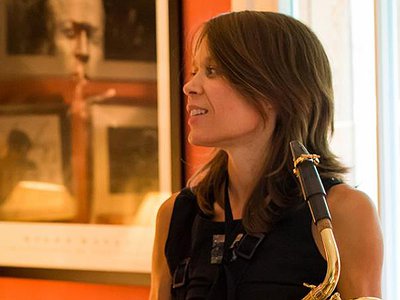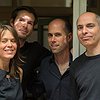Name: Céline Bonacina
Nationality: French
Occupation: Saxophonist, Composer
Current Release: Crystal Rain on Cristal Records
Musical Recommendations: Gwilym Simcock and Chris Jennings: two fantastic musicians with whom I recorded Crystal Rain album. They both have their own bands and projects.
Website: If you enjoyed this interview with Céline Bonacina, you can find out more information on her website.
When did you start playing your instrument and what or who were your early passions or influences?
I started playing the saxophone at the age of 8. My father was a trumpet player and often performed in a big band, so I was touched by jazz music very early. At that time, my dream was to play with him in this band!
For most artists, originality is first preceded by a phase of learning and, often, emulating others. What was this like for you? How would you describe your own development as an artist and the transition towards your own voice?
I first studied classical and contemporary music during long years in many music schools. I spent many years playing standards, practicing a lot, and playing jazz solos of musicians I loved. Actually, until I wrote my first composition in 2000, ('Bar Emergence', which is on my first album Vue d'en haut) I couldn't imagine that I could develop my own style. I think that finding my own voice came about through a mix of studying and being connected with a kind of strength, trust and urgency to create.
Tell me about your instrument, please. How would you describe the relationship with it? What are its most important qualities and how do they influence the musical results – and possibly even your own performance?
I play three different saxophones: soprano, alto and baritone. It's the baritone saxophone I would like to tell you about; the instrument enabled me to explore so different moods and ways of playing that I have the impression that it is like an extension of myself. With the baritone saxophone, I can explore a large range of expression from low to high notes, and special kinds of grooves.
Many artists feel as though, at some point, certain people gave them the “permission to do certain things”. How was that for you – in which way did the work of particular artists before you “allow” you to take decisions which were vital for your creative development?
I think that artists who teach me something are those who I feel create with sincerity, as they are. I think for example about the guitarist Nguyên Lê or the saxophonist John Surman.
What were some of your main artistic challenges when starting out as an artist and in which way have they changed over the years?
Actually, I didn't really think about artistic challenges. They seem to still be the same: to be creative and OK with my choices. Maybe the form changes with each experience, and with new musicians, but the spirit seems to be the same: life and authenticity.
What do improvisation and composition mean to you and what, to you, are their respective merits?
Improvisation enables me to compose. Their "movements" are different.
How do you see the relationship between sound, space and performance and what are some of your strategies and approaches of working with them?
The sound depends a lot on what space I can put into the music, especially in the context of improvisation. I also can play with different acoustics, resonances etc.
Derek Bailey defined improvising as the search for material which is endlessly transformable. Regardless of whether or not you agree with his perspective, what kind of materials have turned to be particularly transformable and stimulating for you?
Improvising is like a kind of moment of life inside different sounds, rhythms and moods. It can be independent or in fusion; it is this alternation between the two which can be rich to explore.
Purportedly, John Stevens of the Spontaneous Music Ensemble had two basic rules to playing in his ensemble: (1) If you can't hear another musician, you're playing too loud, and (2) if the music you're producing doesn't regularly relate to what you're hearing others create, why be in the group. What's your perspective on this statement and how, more generally, does playing in a group compare to a solo situation?
What is interesting in improvisation is to install a dialogue with other musicians; it is another step, which is more exciting than only a "dialogue with oneself".
With more and more musicians creating than ever and more, what does this mean for you as an artist in terms of originality? What are some of the areas where you currently see the greatest potential for originality and who are some of the artists and communities that you find inspiring in this regard?
It is difficult today to define what originality is, or what an artist could do to be original. More than originality, I think in terms of soul in music, and how to bring soul to one’s music.
What constitutes a good live performance in your opinion and what’s your approach to performing on stage? How do an improvisation and the recording of this improvisation compare?
A good live performance is when the music is good, when I feel good with myself, with the others musicians, with the audience, and when I feel that we all share the same story with happiness, smiles, and emotions.
Sometimes, we don't have the same impression when we play and when we listen to the same moment recorded. But most of the time, the sensations are similar with experience.
Listening is also an active, rather than just a passive process. How do you see the role of the listener in the musical communication process?
As I said before, I often feel that the audience is an actor in the story we are sharing with them. It is as if the music exists because it is listened and lived by others.
How do you see the relationship between music and other forms of art – painting, video art and cinema most importantly - and in how far, do you feel, does music relate to other senses than hearing alone?
Music can have another sense when it relates to other art. For example, on my last album I imagined a visual story for one of my tunes, ‘Crystal Rain’, and I created a clip to help the listener to go somewhere else, and invite her into my imagination.
Reaching audiences usually involves reaching out to the press and possibly working with a PR company. What's your perspective on the promo system? In which way do music journalism and PR companies change the way music is perceived by the public?
Of course press and promotion helps to inform the audience that you exist!
Do you have a musical vision that you haven't been able to realise for technical or financial reasons – or an idea of what music itself could be beyond its current form?
I prefer not having this vision because all could be different in life for so many reasons. I prefer trying to accept the whole things I realise, and to find some peace with that!


